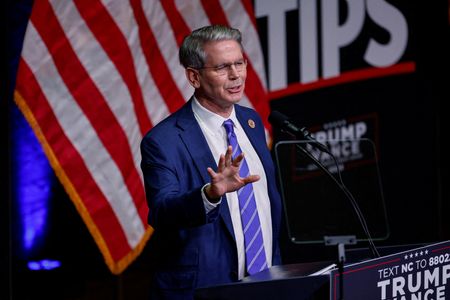Raytheon awarded $71 million in Navy contracts for missile systems
Investing.com -- Treasury Secretary Scott Bessent addressed the Institute of International Finance on April 23, 2025, outlining a plan to restore balance to the global financial system. He emphasized the need for the International Monetary Fund (IMF) and the World Bank to reconnect with their original missions, arguing that mission creep has knocked these institutions off course.
Bessent called for key reforms to ensure the Bretton Woods institutions, created to align national interests with international order, are serving their stakeholders. He suggested that the IMF and World Bank have enduring value but need clear-eyed leadership to build safer, stronger, and more prosperous economies worldwide.
Addressing global imbalances in trade, Bessent stated that the United States is taking action to rebalance global commerce, highlighting the large and persistent U.S. deficits as a result of an unfair trading system. He claimed that intentional policy choices by other countries have undermined America’s manufacturing sector and critical supply chains, putting national and economic security at risk.
Bessent also addressed the issue of China’s economy, stating that it needs a rebalancing. He suggested that China should shift its economy away from export overcapacity and towards supporting its own consumers and domestic demand.
The Treasury Secretary also touched upon the issue of global dependence on U.S. demand to spur growth, expressing concern about policies that encourage excess saving and suppress growth. He suggested that these practices lead to a global economy that is weaker and more vulnerable than it should be.
Bessent emphasized the Trump Administration’s commitment to maintaining and expanding U.S. economic leadership in the world, particularly at international financial institutions like the IMF and World Bank. He criticized these institutions for falling short of their core mandates under the status quo and called for a refocus on these missions.
Bessent stated that the IMF must return to its mission of promoting international monetary cooperation, facilitating balanced international trade growth, and discouraging harmful policies. He criticized the IMF for devoting disproportionate resources to work on climate change, gender, and social issues, arguing that these are not part of the IMF’s mission.
Similarly, Bessent argued for the World Bank to return to its original mission of helping developing countries grow their economies, reduce poverty, increase private investment, support private-sector job creation, and reduce dependence on foreign aid. He criticized the Bank for straying from its initial mission and called for it to focus on increasing energy access and applying its graduation policy.
In conclusion, Bessent invited allies to work with the U.S. in rebalancing the international financial system and refocusing the IMF and World Bank on their founding charters. He expressed optimism that a more sustainable international economic system will better serve the interests of the United States and all other participants in the system.
